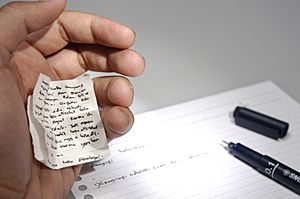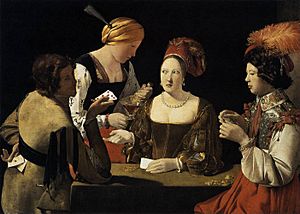Cheating facts for kids
Cheating means acting dishonestly to get an unfair advantage. It often involves lying, trickery, or breaking rules. People usually cheat to help themselves, sometimes at the expense of others.
Contents
Cheating in School
Cheating often happens in schools. It can take many forms during tests or schoolwork. Students might share answers with each other. They might also use secret notes, sometimes called "crib sheets." Getting test questions or answers before the test is also cheating.
For essays or papers, cheating is called plagiarism. This means using someone else's words or ideas without giving them credit. Sometimes, students even pay someone else to do their work for them. This is known as "contract cheating."
With the internet, it's easier to plagiarize. Many schools use special tools to find copied work. Most colleges have clear rules about plagiarism and what happens if you cheat.
Most people think cheating is wrong. If caught, cheaters can face serious consequences. In some colleges with an honor code, cheating can even lead to being expelled from school. Honor codes seem to help reduce cheating, but it still happens often among students.
Cheating in Sports
When athletes break the rules of a game, they are cheating. For example, in soccer, if a player uses their hands to touch the ball (unless they are the goalie), they are cheating.
Another way athletes cheat is by using performance-enhancing drugs. These drugs help them play better than they normally could. Famous athletes like Ben Johnson and Lance Armstrong were caught using drugs to cheat in their sports.
Trying to hurt an opponent on purpose is also a form of bad sportsmanship. It is very close to cheating because it breaks the spirit of fair play.
Laws and Rules
Governments have laws that everyone must follow. If someone breaks a law, they can be punished. This might include jail time or paying fines.
Sometimes, people cheat in ways that are not against the law. In these cases, they cannot be punished by the legal system. However, they might still face other consequences.
Cheating in Politics
Politicians are expected to be very honest. If a politician is caught cheating, even if it's not illegal, they can lose trust. People might stop believing them or supporting them. If there is enough proof, they could be discredited. This means people will see them as a lying cheater.
Rules in Organizations
Organizations like schools also have their own rules. These rules are not the same as laws, but people can still be punished for breaking them. For example, a student might get detention for breaking a school rule.
Cheating in Games
Cheating is also common in video games. One of the first famous cheat codes was the "Konami Code." Game developers at Konami created it to help them test games that were too difficult. You can learn more about cheat codes and how they work in video games by looking up cheat code.
Images for kids
-
This 1822 newspaper describes how strings, secretly attached to bowling pins, allowed an accomplice to help a cheater get higher bowling scores.
See also
 In Spanish: Hacer trampas para niños
In Spanish: Hacer trampas para niños
 | Georgia Louise Harris Brown |
 | Julian Abele |
 | Norma Merrick Sklarek |
 | William Sidney Pittman |






